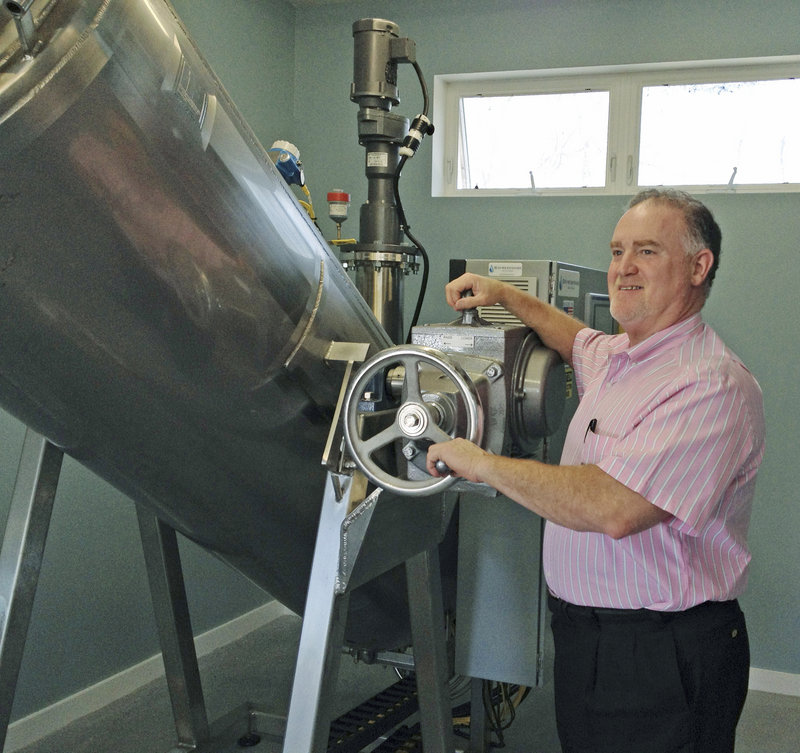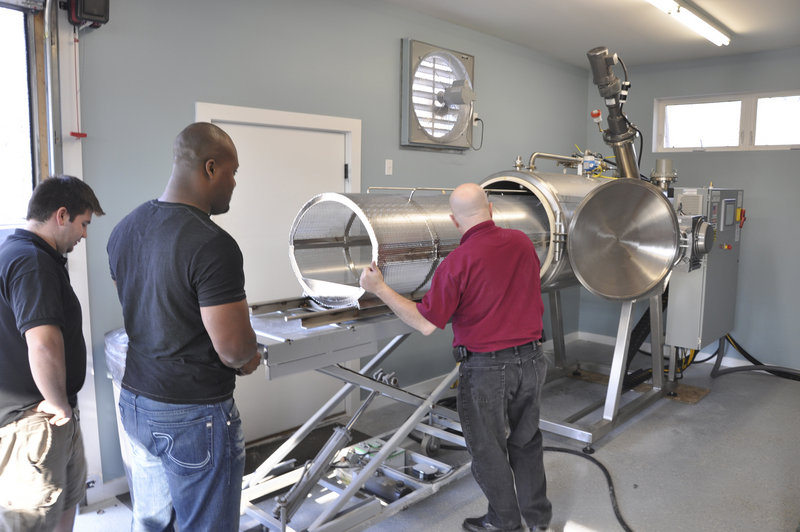Going green has been a way of living. Now, it’s also a way of dying.
A funeral home owner in midcoast Maine has started offering cremation without the carbon emissions.
The process, called alkaline hydrolysis, breaks down the body into chemical components, leaving behind a brown liquid and a pile of brittle bones.
Direct Cremation of Maine in Searsport had the system installed this week, becoming the second commercial crematory in the country to offer the service.
Mark Riposta, owner of Direct Cremation and the Riposta Funeral Home in Belfast, said the business decision was easy.
“Look at every piece of advertising you have out there today: ‘These are green lights.’ ‘This is green cleaner, green hand soap.’ ‘This is green toilet paper,’” he said. “This is the future.”
The process requires propane to heat 50 gallons of water to 208 degrees, and electricity to circulate it for 12 hours through a casket-sized steel vessel, but still takes about one-tenth of the energy that incineration does, said Joe Wilson, who sold the system to Riposta.
Riposta likens it to an accelerated version of natural decomposition.
“If you buried someone in the ground, in 20 years you’d get exactly back what you get in 12 hours” of alkaline hydrolysis, he said.
The process starts when a body is put into a cylindrical steel basket that slides into a tube-shaped machine, Wilson said. A lye-like substance and hot water are added to dissolve the body into a brown effluent that contains sugars, salt, soap, peptides and amino acids.
Carbon dioxide is added to the liquid to lower the pH, so it can be safely discharged into the sewer system, Wilson said. The bones that remain are dried and ground into ash.
Wilson’s company, Indiana-based Bio-Response Solutions, is one of four manufacturers of alkaline hydrolysis systems, according to the Cremation Association of North America.
The process has become popular for disposing of animal carcasses and bodies donated to science. The Mayo Clinic in Minnesota has been using alkaline hydrolysis since 2006.
The first funeral home owner to buy Wilson’s machine was Jeff Edwards of Ohio, who processed 19 bodies about a year ago before he was shut down by the state’s health department because there were no regulations, Wilson said.
He said Ohio legislators are amending state laws to permit the process, and he expects Edwards’ machine to be back in operation this summer.
Last fall, the Anderson-McQueen funeral home in Florida installed an alkaline hydrolysis system made by a Scottish company, Resomation Ltd.
By all accounts, it’s the only commercially operated system in the country — until this week.
Riposta shouldn’t run into a regulatory barrier, because Maine legislators have already addressed the issue. The state is one of eight that changed their laws to allow alkaline hydrolysis.
New Hampshire banned the process in 2008, after a spokesman for the Roman Catholic Diocese described it as “undignified,” according to reports by ABC News and other media.
Lynn Cornfield, who issues air permits to crematories for the Maine Department of Environmental Protection, said Maine decided to change its laws after issues arose at crematories in other states.
The state’s rules, adopted in 2009, expanded the definition of cremation to include processes other than “using direct flame or heat” — a change that has made all the difference to Riposta.
Because the equipment cost $150,000, Riposta is charging $1,000 more for the specialized service, which he’s calling “natural green cremation.” A traditional cremation costs $995.
A few families have signed up their loved ones for the service, said Riposta, who expects to run a body through the machine for the first time today or Friday.
At least one of Riposta’s competitors doesn’t see the new venture taking off.
“It’s basically like bringing people to dissolve their tissue. … People aren’t going to like it,” said Chris Stilkey, owner of Lighthouse Crematory in Freeport.
Stilkey said he looked into the technology a couple of years ago and wasn’t convinced that it was better for the environment than incineration.
“It don’t believe it’s that green,” he said, considering that propane is used to heat the water.
Cornfield, from the DEP, said she considers traditional crematories to have a “very, very slight” impact on the environment, and hasn’t seen proof that alkaline hydrolysis has less of an effect.
“If you look at the facts, I can’t say that one appears any greener than the other,” she said. “This is an alternative, and it seems to be quite fine.”
Letting people know their after-life options is a good thing in the eyes of the Funeral Consumers Alliance of Maine, said its president, Delene Perley of Windham.
“We’re interested in how this might work for people,” she said.
Perley said some people she has talked to about alkaline hydrolysis haven’t reacted well to the idea of their dead body dissolving.
“They go, ‘Oh, gross,’” she said.
Personally, Perley doesn’t think it sounds all that bad.
“How is that any different from burning?” she said.
Riposta said it’s proven that, when given the choice, some people will choose to do what’s better for the environment. He doesn’t see why it will be any different for his service.
“There’s something about doing the right thing for the earth we live in,” he said. “They feel good about it.”
Staff Writer Leslie Bridgers can be contacted at 791-6364 or at:
lbridgers@pressherald.com
Send questions/comments to the editors.





Success. Please wait for the page to reload. If the page does not reload within 5 seconds, please refresh the page.
Enter your email and password to access comments.
Hi, to comment on stories you must . This profile is in addition to your subscription and website login.
Already have a commenting profile? .
Invalid username/password.
Please check your email to confirm and complete your registration.
Only subscribers are eligible to post comments. Please subscribe or login first for digital access. Here’s why.
Use the form below to reset your password. When you've submitted your account email, we will send an email with a reset code.